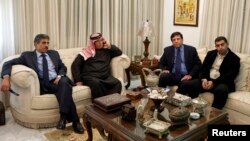The father of a Jordanian captured by Islamic State militants in Syria is pleading with the rebel group for the fighter pilot's safe return.
The father appealed to the religious extremists to treat First Lieutenant Muath al-Kasaesbeh as a "guest," not a hostage, telling them "we are all Muslims."
"I send a message to our generous brothers of the Islamic State in Syria: (I ask them) to host my son, pilot Muath, with generous hospitality, and they (referring to the Islamic State) are generous, and (I ask them) not to be ungenerous toward my son," said Safi al-Kasaesbeh, father of captured pilot. "I ask God to fill their hearts with love, and (I ask for him) to be returned to his family, wife and mother."
Jordan confirmed Wednesday that the pilot was being held. The F-16 fighter jet he was flying as part of the U.S.-led coalition against the Islamic State group went down near the rebel stronghold of Raqqa, in northern Syria.
The U.S. military acknowledged that the plane crashed, but it denied a claim by Islamic State militants that they shot it down.
Jordan is one of several countries in the region participating in the air campaign against the group.
Iraqi Prime Minister Haider Abadi and Turkish Prime Minister Ahmet Davutoglu on Thursday announced an agreement between the two countries to expand cooperation in fighting the Islamic State group.
In the last year, the extremist militants overran large areas of northern and western Iraq and launched an offensive in Syria along the Turkish border.
Abadi said Turkey and Iraq would collaborate on military, intelligence, weapons and training.
"Neither the Iraqi government nor the entire international community is in a position to defend themselves against Islamic State," Abadi said. "This is a terrorist organization; they have an international network. Therefore, we need international support to fight them, and we've asked for it. We've made a request within the international framework to receive military training in operating weapons used in airstrikes."
The countries both have vocal Kurdish minorities. Despite long-standing movements for independence, they have become a central force in countering the Islamic state with their militias.
Davutoglu indicated Turkey had helped train Kurdish peshmerga fighters in Iraq and would continue supporting the country against the militant group.
"We are open to any suggestions to support the Iraqi government, and we will weigh any suggestion," Davutoglu said. "Talks are underway with Iraqi security officials to expand our support in the fields of training and supply, as well as helping further cooperation in other fields. We are ready for all kinds of help."













